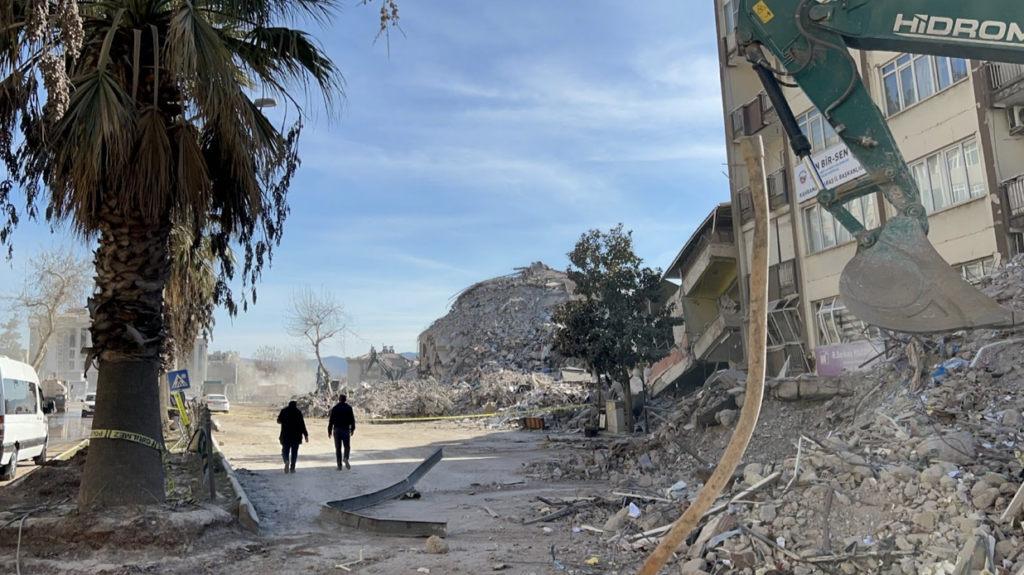Updates & Press
Reports | May 8, 2023
Retraumatized – The Psychological Impact of
Author | MedGlobalComms

Executive Summary
Earthquakes and natural disasters as a whole have noticeable and immediate impacts on the physical and psychological landscape of a nation. Natural disasters have been shown to result in a higher likelihood of the development of mental health disorders in numerous studies following hurricanes, tsunamis, earthquakes, and floods alike. A 7.8 magnitude earthquake devastated southern Turkiye and northern Syria on February 6, 2023. It impacted 23 million people in both countries and was the worst earthquake that hit the region in the past 200 years.
The Syrian conflict, now in its twelfth year, has resulted in a complex humanitarian emergency, including the displacement of half of its population, a global refugee crisis, and the disintegration of the public health system. Syria has been divided into four regions that are controlled by different groups, each with it’s separate healthcare system. The crisis has also created an unprecedented strain on health services and systems due to the protracted nature of the warfare, the targeting of medics and health care infrastructure, the exodus of physicians and nurses, the shortage of medical supplies and medications, the unprecedented and enormous displacement of populations internally and externally, and the disruption of medical education and training.
The Syrian conflict has had a severe psychological impact on its civilians, resulting in high levels of mental health problems such as depression, anxiety, and post-traumatic stress disorder. Many Syrians have experienced traumatic events such as bombings, shootings, and forced displacement that have contributed to these mental health problems. The lack of access to mental health care and support further exacerbates the psychological impact of war on Syrians, leaving many without adequate treatment or resources.
The goal of the MedGlobal Mental Health and Psychosocial Support Program is to utilize lessons learned from work experience in the Syrian context to improve access to mental health services for the victims of war and displacement, especially marginalized and vulnerable communities. MedGlobal achieves this goal through partnerships with local organizations to provide a variety of mental health services in the Turkish-Administered areas in Northern Syria.
In February 2023, MedGlobal deployed a team of psychiatric professionals to conduct post-disaster mental health training in Northwest Syria. The training covered a myriad of subjects that were found to be essential in the sub-acute disaster period. Following the training, surveys were distributed to the participants. The survey showed that 46.5% of the participants had never encountered a training similar to what we had presented, 100% of the respondents reported that they were able to learn new information from our presentations, and 97.2% reported that they felt they could use lessons learned from the trainings to apply to their work on the ground.
In the aftermath of the earthquake, rebuilding Syria’s shattered health system should be a priority. Such undertaking requires a holistic approach that addresses a number of issues. Among the most important ones include focusing on the retention of health workers, providing support and training, and establishing incentives for those who have left to return. Additionally, building resilience through training should be a priority for healthcare authorities, non-governmental organizations, and funders. Healthcare workers should receive training on vulnerabilities, screening, and trauma-informed, culturally-specific mental health and medical treatments for sequela and harm from trafficking. They should receive services on child trauma and refugee mental health. NGOs should be trained in Psychological First Aid and Skills for Psychological Recovery in accordance with the World Health Organization Information Sharing and Analysis Center (WHO ISAC) recommendations. This could be integrated into current trainings on gender-based violence, or mental health in disasters. Trainers must adopt a multifactorial approach when addressing mental health. Mental health issues are complex and can be influenced by various social, economic, and cultural factors. It is crucial to consider all of these to effectively address mental health issues.
In the wake of disaster and after twelve years of war, the use of substances as a maladaptive mechanism to cope increased in Syria among vulnerable populations including healthcare workers. The use of the drug Captagon, narcotics, and pain medications have become a significant issue There must be an orchestrated effort to create awareness campaigns surrounding substance abuse, educate healthcare workers on symptoms of withdrawal and intoxication, create a substance use training program to educate local psychosocial support staff and establish more substance abuse recovery programs.
The United Nations (UN) and other funders should direct more funds towards mental health support, training of healthcare providers, nurses, and community health workers. Additional funds should also be directed to education to reduce the impact of the crisis on the mental health of children. Cross-border humanitarian aid under the auspices of the United Nations should be maintained through the current open three border crossings and expanded further to prevent the delay or disruption of humanitarian aid to northern Syria. Plans should be developed for post-crisis recovery, linking the disconnected healthcare systems, and rebuilding the healthcare system with the involvement of local health authorities and healthcare-focused NGOs. The United Nations should reach a political solution for the Syrian conflict based on UNSCR 2254.
Read Full Report Here[/vc_column_text][/vc_column][/vc_row]


